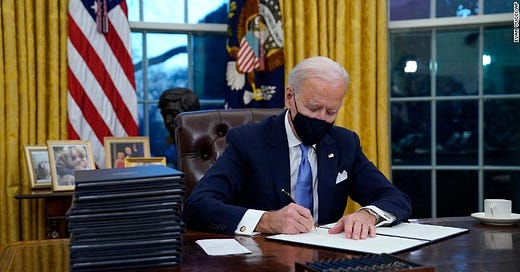Alice Stock, NLRB General Counsel (Jan. 21, 2021 – Jan. 21, 2021)
The Robb firing showed Biden was serious about helping the NLRB. The Stock firing shows Biden is committed.
January 20, 2021 was one of the best days for NLRB watchers and the labor movement in many years. It was inconceivable that January 21 could have matched it, but it came surprisingly close.
Less than 24 hours after newly inaugurated President Joe Biden fired Trump’s holdover General Counsel, Peter Robb, following the latter’s refusal to resign as requested, Biden fired NLRB lawyer Alice Stock almost immediately after her internal elevation to the Acting GC role.
Stock was previously the agency’s Deputy General Counsel, the second-most powerful role in the GC’s office. Not coincidentally, she was a career management lawyer who was personally plucked out of private practice by Robb to serve as an Associate GC in 2018 and was promoted to the right-hand job within a year. So while Robb absorbed all of the media flack for his role in yanking the agency off its statutory axel, the top-two positions in the agency were essentially one and the same.
This became important yesterday when Stock was automatically elevated to the top job following Robb’s firing. The pessimist in me assumed that the big guns had been unholstered for Robb but would now be silent with him gone. I’m very happy to be wrong. Biden’s labor advisers clearly understand the gravity of the situation and how deep the hole the NLRB is in. Any stewardship of the Board by a lawyer who is against the core principles of the National Labor Relations Act—even on a temporary basis—works to dig that hole deeper.
Combine this slate of news with the pick of career Steelworker official Jim Frederick to a top OSHA role and the selection of former NLRB Member and progressive labor lawyer Sharon Block to a major regulatory post at the OIRA, and I think even the biggest skeptics among us can admit that Biden is exceeding expectations so far in the labor realm. We can thank the visionary people who have the President’s ear and the unions that have been agitating for bold, Day One action since the election for these quick results.
So what can we expect next at the NLRB? An Acting GC—Biden’s Acting GC—should be forthcoming any minute. It can’t be just anyone off the street; it has to be a top official in the General Counsel’s office or a Regional Director to avoid potential Vacancy Act issues. HuffPost’s Dave Jamieson floated Region 13 (Chicago) Director Peter Ohr as a potential candidate. I think that would be a stupendous pick, if nothing else for Ohr’s application of the NLRA in the Northwestern football union case. (He issued a Decision and Direction of Election which held the players were employees under the Act and thus possessed Section 7 rights to organize; the full Board in Washington punted on the case for jurisdictional reactions without reaching the substantive issue.)
A temporary elevation of Ohr or another Regional Director to the Acting GC role has precedent. In the 1990s, Bill Clinton selected Region 2 (New York) RD Daniel Silverman to run the GC’s office while nominee Frederick Feinstein awaited confirmation. Silverman served in the role for a little over three months.
Whoever it ultimately is, this person would assume the General Counsel’s duties for the weeks or months necessary until Biden’s nominee achieves Senate confirmation. Importantly, the Acting GC cannot serve in the role while awaiting confirmation for the full-time job because of the Supreme Court’s NLRB v. SW General decision, which rendered poor Lafe Solomon’s time as Acting GC a political nullity. Biden’s team won’t make the same mistake.
Whatever the outcome of these personnel maneuvers, I think most of us can agree that it’s refreshing to see the NLRB be treated like the key administrative agency that it is. Labor law matters, and it’s high time that politicians acted like it does.






Curious whether the delay in appointment is due to some of the same weirdness surrounding removal-versus-resignation that we saw in some of the Trump cases (e.g. Geoffrey Berman). I can't fathom why it would make any difference at all to the Vacancies Act whether someone left voluntarily or involuntarily, but a lot of liberals made a lot of noise about such claims...
Also curious whether Robb's refusal to resign was intentionally designed to trigger such problems.
And finally, another oddity that I discovered-- the next person in the line of succession is the head of the Division of Operations Management, Beth Tursell, who is... not a lawyer (and also, perhaps more importantly, Robb's chief enabler among the career staff at the agency). Can a non-lawyer even hold the post of Acting General Counsel? Or is she skipped over (in which case the position would go to Richard Bock, who would be a fine choice as a temporary matter)?
I guess the correct answer, as always, is "just confirm someone and then belt-and-suspenders ratify the crap out of everything."